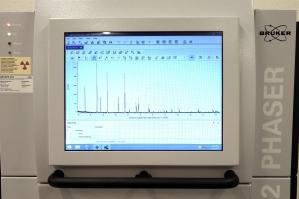Bruker D2 Phaser
This bench-top diffractometer is our go-to instrument for any samples that contain elements that normally fluoresce under Cu X-rays. It is simple to learn and produces great data for phase-id measurements on powders or small bulk samples.

About
Location: Jesser Hall room 112
The D2 Phaser bench-top X-ray diffractometer from Bruker was added to the lab in May 2023. It is our best diffractometer for measuring the diffraction of samples that would normally fluoresce under Cu X-rays. It is also great for all techniques in which the omega and 2theta arms move in sync. All samples must fit within our powder samples or our small bulk-sample holders (see below for dimensions).
XRD Applications:
- Bragg-Brentano (para-focusing) geometry in reflection mode
- Phase ID
- Quantification of phases
- Rietveld refinement
- Fluoresence suppression
XRD Features:
- Source: Air-cooled sealed X‐ray tube with Cu anode (1.54 Å wavelength) operating at 300 Watts (30 keV / 10 mA)
- Detector: LYNXEYE XE-T
- 0-D (point) and 1-D (line) modes available, with pseudo 2-D collection via the BRAGG2D technique
- up to 192 channels covering up to 5.8° 2theta at once in 1-D mode
- high resolution and high intensity modes availble
- Sample Stage: Single-sample spinner stage
- Powder sample holders: 27 mm diameter x 2.4 mm deep; 25 mm diameter x 2 mm deep; 16 mm diameter x 2.4 mm deep; zero-background
- Bulk sample holder: 44 mm diameter x 6.5 mm deep
- Customizable optics for the incident and diffracted beam
- Four sizes of fixed divergence slits (0.1, 0.2, 0.6 and 1.0 mm)
- Three sizes of Soller slits (1.5, 2.5 and 4° )
- Air scatter screen (1 and 3 mm opening) and air scatter slits (3 and 8 mm opening)
- Ni filters for K-beta radiation (high intensity mode)
- Cu attenuator
- Diffractometer radius of 141.5 mm with maximum accessible 2theta of 152°
- Data collection software: Diffrac.Measurement
- Data Analysis software: Diffrac.EVA and TOPAS
- Nine simultaneous users may run the analysis software on any computer connected to the UVA network. Contact NMCF staff for details.
- Access to the PDF4+ database for search/match algorithms is available only on one data processing computer in Jesser 118.
- All other computers have access to the Crystallographic Open Database (COD) and/or Cambridge Structural Database (CSD)
- Various user manuals and tutorials in hard-copy and electronic formats
Questions? Comments?
Diane Dickie
Senior Scientist, Depts. of Chemistry and Materials Science & Engineering
Principal Scientist and Crystallographer for XRD
Dr. Diane Dickie joined the Chemistry Department in January 2018 as a Senior Scientist and X-Ray Crystallographer. She is has a joint appointment with the Materials Science Department. Her office is Room 103 in Jesser Hall (Materials Science and Engineering).